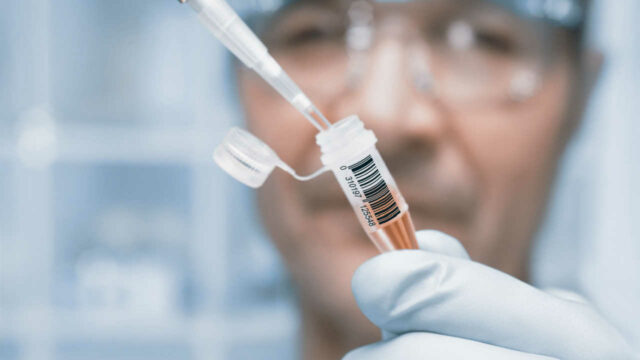
BioInvents CMO kommenterar fas I/IIa-data med BI-1808
BioInvents fas I/IIa-studie med first-in-class anti-TNFR2-antikroppen BI-1808 i avancerad cancer har gett positiva resultat. De starka interims-säkerhetsdata banar väg för fas IIa-delen av studien. BioStock kontaktade bolagets CMO Andres McAllister för att få veta mer.
BioInvent är ett bioteknikbolag som utvecklar first-in-class-läkemedel för cancerbehandling. Fokus är att identifiera nya antikroppar som avsevärt kan förbättra effekten av nuvarande checkpoint-hämmare och/eller uppnå immunaktivering hos patienter som inte längre svarar på behandling.
BI-1808 – en first-in-class-kandidat
Bolaget har ett brett utbud av kandidater som har tagits fram genom den egenutvecklade teknologiplattformen F.I.R.S.T., inklusive BI-1808, som syftar till att behandla solida tumörsjukdomar, såsom icke-småcellig lungcancer (NSCLC) och äggstockscancer samt blodcancerformen CTCL (Cutaneous T-Cell Lymphoma). Läkemedelskandidaten BI-1808 är en antikropp som riktar sig mot TNFR2 (tumörnekrosfaktor-receptor 2). Detta protein spelar en viktig roll för tumörspridning och överlevnad, och har erkänts som ett nytt och lovande mål för immunterapi.
BI-1808 anses vara en first-in-class läkemedelskandidat. Den utvärderas för närvarande i en fas I/IIa-studie med fokus på säkerhet, tolerabilitet och möjliga signaler på effekt som monoterapi samt i kombination med anti-PD-1 checkpoint-hämmaren pembrolizumab. I studien kommer patienter med avancerad cancer ingå, vars sjukdom har försämrats efter standardbehandling.
Positiva fas I/IIa-data
BioInvent tillkännagav förra veckan positiva interimsdata för studien, som inte visade några signifikanta säkerhetsavvikelser i samband med administrering av BI-1808 som monoterapi. 24 patienter doserades i ett intervall på 25–1000 mg där 22 patienter utvärderades med avseende på effekt. BI-1808-infusionerna tolererades väl, och ingen dosbegränsande toxicitet eller allvarliga biverkningar relaterade observerades vid någon dosnivå.
Stabil sjukdom har observerats hos sex patienter hittills – en i 25 mg-kohorten, tre patienter på 75 mg, en vid 225 mg och en vid 1000 mg. Effekten av BI-1808 som monoterapi och i kombination med pembrolizumab kommer att undersökas ytterligare i den efterföljande fas IIa-delen av studien, som är avsedd att inkludera ett större antal patienter och fördefinierade cancertyper. Fas IIa-studien av BI-1808 som monoterapi planeras att starta under H2 2023.
CMO kommenterar
BioStock fick möjlighet att prata med BioInvents CMO Andres McAllister, som gav sitt perspektiv som expert på betydelsen av dessa resultat.
Andres, for those who are not aware, why is TNFR2 a promising target?

– TNRF2 is the second receptor for TNF. As opposed to TNFR1, which is expressed widely in the body, and is an important target for the treatment of autoimmune diseases such as Rheumatoid Arthritis, TNFR2 has a limited expression, and in cancer, it is highly expressed in the tumor microenvironment (TME). There, it is mostly expressed by regulatory T cells (Tregs), which are tumor-promoting cells that help cancer escape from immune recognition. Our goal is to drastically modify the existing dynamics of the TME to alter the tumor-promoting conditions that prevail, and modify them to enhance tumor recognition and immune attack of the tumor.
In terms of mechanism of action, how does BI-1808 act upon TNFR2, and what are the downstream effects?
– In that context, BI-1808 has the capacity to accomplish two highly desirable effects: first, it significantly decreases the number of Tregs present in the TME; and second it increases the number of cytotoxic T cells (CD8+ T cells), which are the cells capable of attacking and destroying the tumor. It turns out that this ratio (Tregs / CD8+ T cells ) is a key determinant of the capacity of the immune system to destroy the cancer cells. Our preclinical data demonstrate that BI-1808 has a very positive effect on this ratio, and not surprisingly, the best antitumoral effect we have observed as compared with other immune checkpoint inhibitors. Needless to say, the potentially synergistic activity with other immune checkpoint inhibitors appears blatant and, of course, has elicited a great deal of interest from clinical investigators and key opinion leaders.
Why are these phase I/IIa interim safety data important?
– In the process of drug development, safety and tolerability of the drug is a key component. This is related to the doses one can administer safely, and more importantly, to the exposure of the patient to the drug. For the most part, these safety aspects are difficult to predict. In the case of BI-1808, we are happy to report that our first-in-class drug candidate has been extremely well tolerated and we have observed no safety concerns whatsoever. This means that we can treat cancer patients at doses where we are sure the target is being reached and “engaged” at near 100% saturation, e.g., every TNFR2 present in the individual should be reached by the antibody. And this without side effects! Thus, it allows us to give patients the best chances to respond to the drug, and to explore the best regimens that should be employed to use the drug in the most optimal way.
How do these results shape your planning for future clinical evaluation with BI-1808?
– The combination with other drugs is the future, not only for BI-1808, but also for most drugs intended to treat cancer. When those combinations are put in place, a matter of concern is the safety profile of the combination treatment. In that context, having one of the components that poses little concern is a tremendous asset. Since we are now in the dose-escalation part of our study in combination with pembrolizumab (an anti-PD1 agent), and we can safely expect little or no increased toxicity from the combination. This combination can therefore be tested in different patient populations, and different lines of treatment without reasons for concern. The possibilities are therefore enormous.
Innehållet i BioStocks nyheter och analyser är oberoende men BioStocks verksamhet är i viss mån finansierad av bolag i branschen. Detta inlägg avser ett bolag som BioStock erhållit finansiering från.

